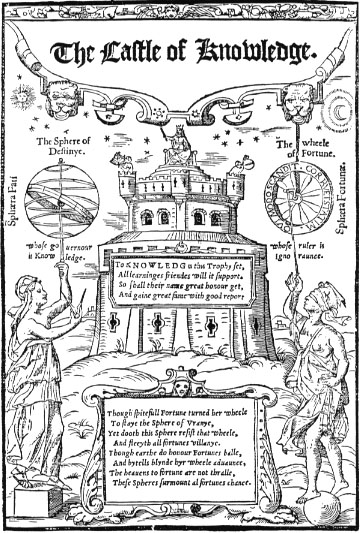Introduction
Nicholas Copernicus
De Revolutionibus
John Dee
The Mathematicall Praeface
Robert Recorde
The Castle of Knowledge
Marcellus Palingenius Stellatus
The Zodiake of Life
Thomas Digges
A Perfect Description of the Celestial Orbs
Giordano Bruno
The Ash Wednesday Supper
Galileo Galilei
Dialogue Concerning the Two Chief World Systems
Bibliography


From the fourth treatise of The Castle of Knowledge, by Robert Recorde
| Master: | ... And this may suffice for this Pine touching the earth and his accidents, principally appertaining to Astronomy: for although many other things are to be considered in it, they appertain rather to the philosophers, or Cosmographers, than to astronomers, and namely the doctrine of principles. As touching the distinction of the zones, I have said somewhat before, and will say more anon. But as for the quietness of the earth I need not spend any time in proving it, since that opinion is so fixed in most mens heads, that they account it mere madness to bring the question in doubt. And therefore it is as much folly to travail to prove that which no man denieth, as it were with great study to dissuade that thing, which no man doth covet nor any man alloweth: or to blame that which no man praiseth, nor any man liketh. |
| Scholar: | Yet sometime it chanceth, that the opinion most generally received, is not most true. |
| Master: | And so do some men judge of this matter, for not only Eraclides Ponticus, a great philosopher, and two great clerks of Pythagoras' school, Philolaus and Ecphanrus, were of the contrary opinion, but also Nicias Syracusius, and Aristarchus Samius, seem with strong arguments to approve it: but the reasons are difficult for this Introduction, & therefore I will omit them till another time. And so will I do the reasons of Ptolemy, Theon, & others do allege, to prove the earth to be without motion: and the rather, because those reasons do not proceed so demonstrably, but they may be answered filly, of him that holdeth the contrary. I mean, concerning circular motion: marry direct motion out of the center of the world, seemeth more easily confuted, and by the same reason, which being before alleged for proving the earth to be in the middle and center of the world. |
| Scholar: | I perceive it well: for as if the earth were always out of the center of the world, those former absurdities would at all times appear: so it at any time the earth should move out of his place, those inconveniences would then appear. |
| Master: | This is truly to be gathered: howbeit, Copernicus a man of great learning, of much experience, and of wonderful diligence in observation, hath renewed the opinion of Aristarchus Sainius, and affinnith that the earth not only moveth circularly about his own center, but also may be, yea and is, continually out of the precise center of the world 38 hundred thousand miles: but because the understanding of that controversy dependeth upon profounder knowledge than in this Introduction may be uttered conveniently, I will let it pass till some other time. |
| Scholar: | Nay sir in good faith, I desire not to hear such vain fantasies, so far against common reason, and repugnant to the consent of all the learned multitude of Writers, and therefore let it pass forever, and a day longer. |
| Master: | You are too young to be a good judge in so great a matter: it passeth far your learning, and theirs also that are much better learned than you, to improve [disprove] his suppositions by good arguments, and therefore you were best to condemn no thing that you do not well understand: but another time, as I said, I will so declare his supposition, that you shall not only wonder to hear it, but also peradventure be as earnest then to credit it as you are now to condemn it. In the mean season, let us proceed forward in our former order.... |
Copyright 1999, MATC
Last updated 1 September 1999
